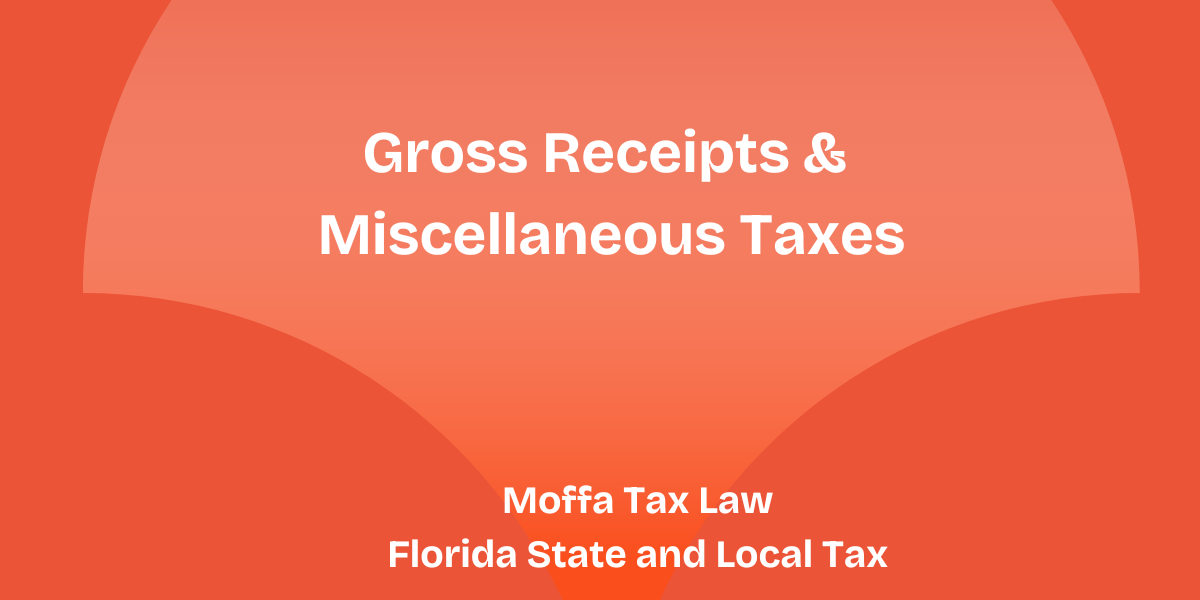NEWS & INSIGHTS


The landscape of gross receipts and miscellaneous taxes continues to evolve as state and local governments clarify and enforce tax policies through legislative updates and court decisions. Below is a summary of recent key developments across various jurisdictions.
Gross Receipts Tax Developments
Washington
Washington Supreme Court Rules on Investment Income Deduction
In Antio, LLC, et al. v. Washington Department of Revenue, Wash. S. Ct., Dkt. No. 102223-9 (Oct. 24, 2024), the Washington Supreme Court ruled 7-2 that investment fund LLCs were not entitled to deduct income earned from their main business activities under the investment income deduction. The taxpayers, 16 related LLC investment companies engaged in buying and selling distressed debt instruments, sought a refund of business and occupation (B&O) tax, arguing that their income was deductible under Wash. Rev. Code § 82.04.4281. However, the court held that the Washington legislature did not express a clear intent to override O’Leary v. Wash. Dept. Rev., 105 Wash.2d 679 (1986), which limited the definition of “investments” to “incidental investment of surplus funds.” As a result, the LLCs’ primary business activities did not qualify for the deduction, and the refund claims were denied.Washington Department of Revenue Guidance on Investment Income
Following the Antio decision, the Washington Department of Revenue issued guidance on investment income deductions. Taxpayers must prove that investment activities are incidental to their primary business activities in order to qualify for the deduction. The guidance specifies that banking, lending, and security businesses do not qualify, and that interest income from loans, credit extensions, and installment sales does not meet the criteria for deduction.Guidance on Legal Settlements and B&O Tax
The Washington Department of Revenue also issued clarifications regarding the taxability of legal settlement proceeds and payments. The guidance states that settlements and insurance payments are subject to B&O tax if they arise from business activities, including lost business income and court-ordered payments. Additionally, settlements for unauthorized use of intangible property, such as copyright infringement, fall under the royalty classification. Conversely, payments for personal injury, property damage, and eminent domain compensation are exempt from B&O tax.
Miscellaneous Tax Developments
Alabama
The Alabama Supreme Court affirmed a lower court ruling regarding the applicability of the Alabama Terminal Excise Tax Act (ATETA) to local legislation governing gasoline tax distribution. The ruling held that while ATETA repealed a general law on gasoline excise tax allocation, it did not repeal a 1969 law specific to Russell County’s share of state gasoline tax revenue. The decision confirms that local tax distribution laws remain in force despite broader state-level tax reforms. (Russell Cty, et al. v. City of Phenix City and Town of Hurtsboro, Ala. S. Ct., Dkt. No. SC-2024-0045, Jan. 10, 2025.)
Nebraska
The Nebraska legislature introduced L.B. 526 on January 22, 2025, proposing an excise tax on cryptocurrency mining operations consuming more than 1,000 kilowatt hours annually. The tax, set at 2.5 cents per kilowatt hour, would be administered by the Nebraska Department of Revenue, with revenues directed to the state’s General Fund. The bill excludes non-cryptocurrency data processing and cloud computing operations from the tax. Additionally, the bill allows public power districts to require financial assurances from cryptocurrency miners for necessary infrastructure upgrades, backed by independent grid impact studies. If enacted, the law will take effect on October 1, 2025.
South Carolina
In DoorDash Inc. v. City of Anderson, S.C. Admin. Law Ct., Dkt. No. 24-ALJ-30-0067-CC (Feb. 7, 2025), the South Carolina Administrative Law Judge ruled in favor of a city’s enforcement of its business license tax on an online platform facilitating restaurant deliveries. The petitioner argued that it merely facilitated transactions and did not conduct business within the city. However, the court held that the petitioner was engaged in business within the jurisdiction and was subject to the tax. The court also dismissed the petitioner’s Dormant Commerce Clause challenge, finding that the ordinance applied equally to all businesses operating in the city, regardless of physical presence. The decision reinforces municipalities’ authority to tax digital platforms operating within their jurisdictions.
Conclusion
These recent developments underscore the dynamic nature of state and local tax policies, particularly in the areas of gross receipts taxation and miscellaneous levies. As states refine tax rules and enforcement measures, businesses should stay informed and ensure compliance with evolving legal interpretations and administrative guidance.
Share
Additional Articles by the SALTy Orange at Moffa Tax Law:
NEWS & INSIGHTS Inside the FTA’s May 2025 Committee Report: What State Tax Officials Are Watching Inside the FTA’s May…
NEWS & INSIGHTS State Conformity with the BBA Partnership Audit Rules: Where Are We in 2025? State Conformity with the…
How Florida’s Sales Tax Auditors Target Convenience Stores (and What You Can Do About It)”
NEWS & INSIGHTS How Florida’s Sales Tax Auditors Target Convenience Stores (and What You Can Do About It) Florida Department…

Jeanette Moffa, Esq.
(954) 800-4138
JeanetteMoffa@MoffaTaxLaw.com
Jeanette Moffa is a Partner in the Fort Lauderdale office of Moffa, Sutton, & Donnini. She focuses her practice in Florida state and local tax. Jeanette provides SALT planning and consulting as part of her practice, addressing issues such as nexus and taxability, including exemptions, inclusions, and exclusions of transactions from the tax base. In addition, she handles tax controversy, working with state and local agencies in resolution of assessment and refund cases. She also litigates state and local tax and administrative law issues.


